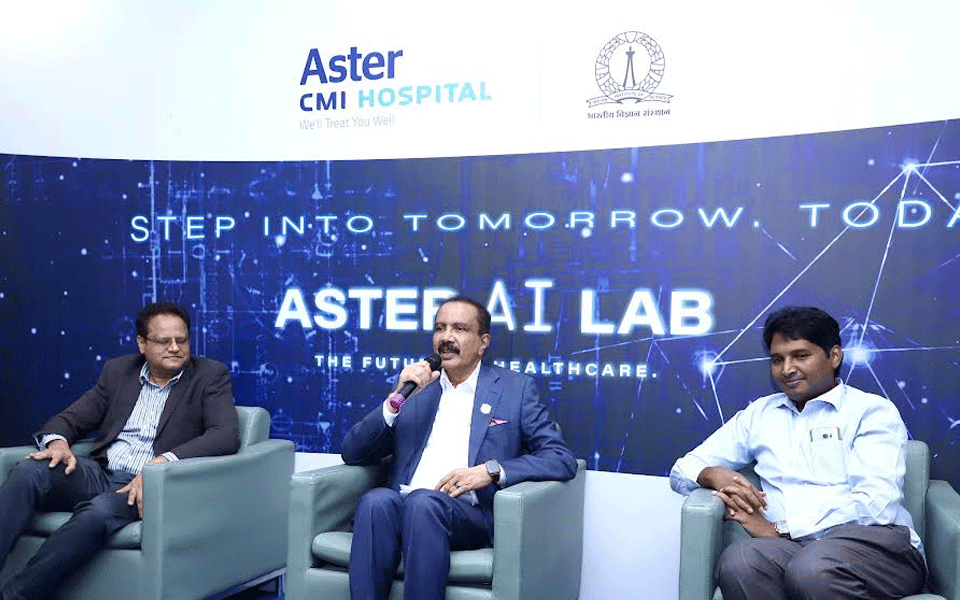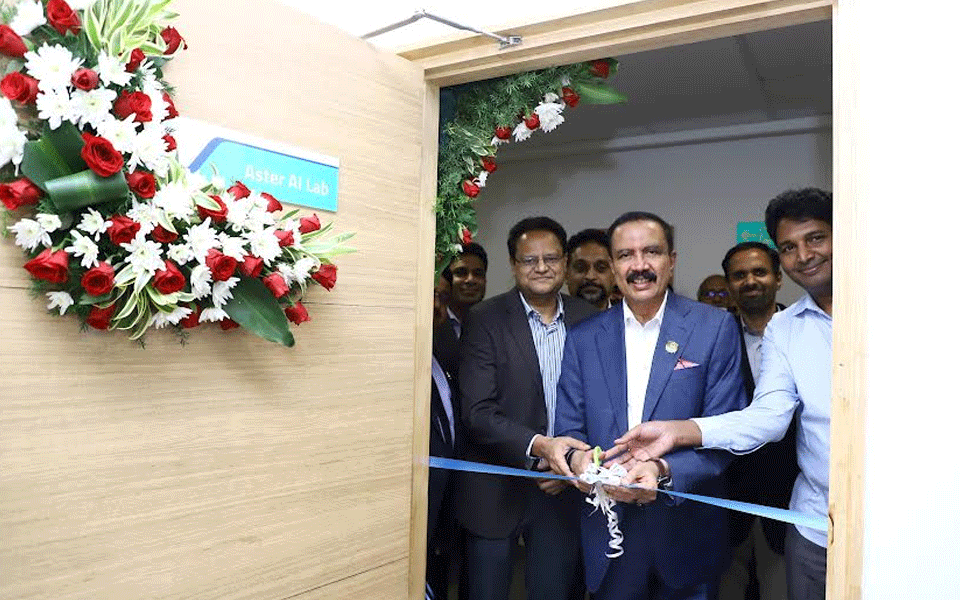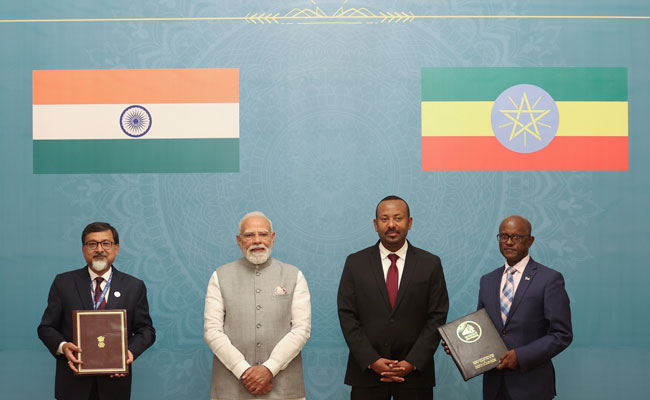Bengaluru(Press Release): In keeping with its commitment to bring quality healthcare using the latest medical technology, Aster CMI Hospital in association with the Indian Institute of Science (IISc) launched an Artificial Intelligence (AI) lab today. The Aster-AI lab is a collaborative lab, set up with the aim to build cutting edge AI products in the healthcare domain and bridge the gap between clinical medicine and technology by training healthcare professionals in AI. Dr. Azad Moopen, Founder Chairman and Managing Director, Aster DM Healthcare, Dr. Lokesh B, Consultant Neurology, Aster CMI Hospital and Dr. Phaneendra K Yalavarthy, Professor of Medical Imaging, Department of Computational and Data Sciences, IISc were present during the launch.
Artificial Intelligence (AI) is an interdisciplinary science creating a paradigm shift in virtually every sector of the industry. AI uses data with machine learning and deep learning algorithms to imitate the way that humans learn, gradually improving its accuracy. These data-driven AI applications have been continuing to change the way doctors solve clinical problems. The current possibilities and capabilities of AI in medicine can enable quicker diagnosis and lower healthcare costs.
Speaking on the need and how technology is transforming the healthcare system in India, Dr. Azad Moopen, Founder Chairman and Managing Director, Aster DM Healthcare, said: “At Aster, we have always believed in staying closely connected with the pulse of our patients and our people to be able to adapt as per their needs and stay ahead of the curve. We have been at the forefront of adopting digitization, technology and innovation into our core operations which is now essential to support patients as per their needs. With the use of AI, doctors and medical providers will now be able to deliver more accurate diagnosis in the fastest possible time which can aid the treatment journey. Also, AI would be a big leap towards predictive and proactive data analytics which will improve preventive care recommendations for patients. We are really glad to partner with IISc, which will open doors for healthcare professionals to undertake research and better utilize AI tools to understand their patient’s disease patterns and improve treatment outcomes significantly.”
Commenting on the collaboration, Dr. Lokesh B, Consultant Neurology, Aster CMI Hospital, said: “We are glad to associate with IISc to launch the Aster-AI lab. This lab will be hosted at Aster CMI to enable faster translation into the clinical care system. This collaboration is only a start; future scope includes exchange of personnel as well as joint workshops for increased cooperation in making AI in medicine more effective both for clinicians as well as patients. This is the first collaborative lab in the clinical environment with an aim to perform impactful as well as translatable research work in the space of AI in medicine.”
Prof. Phaneendra K Yalavarthy has been instrumental in setting up the lab by providing the computational infrastructure and expertise. IISc, with its expertise in the development of AI methods, has become the natural collaborator with Aster CMI, which has the clinical expertise, to aide, translate, and validate the developed AI algorithms for clinical use.
Expressing his excitement to have associated with Aster CMI Hospital, Dr. Phaneendra K Yalavarthy, Professor of Medical Imaging, Department of Computational and Data Sciences, IISc, said: “Artificial Intelligence (AI)-powered medical technologies have been rapidly evolving and have become powerful adjunct tools in clinical practise. The broad spectrum of digital medicine, especially to enable the 4P model of medicine (Predictive, Preventive, Personalized, and Participatory) involves natural collaboration between academic institutions and medical institutions. This Artificial Intelligence lab is a collaborative effort to develop these AI technologies in the hospital settings, such that the translation to clinic will be seamless. The initial focus of this collaborative lab will be in neurology and will later be expanded to other clinical specialities. We are thankful to Aster CMI for providing space to establish this lab at their hospital to enable co-development of some of these AI technologies for healthcare. This collaborative lab will enable the development of highly impactful research and technologies with a focus on translation to the bedside.”
Aster CMI will be working with Prof. Phaneendra and his team on ‘Development of Deep Learning Methods for Automated Tracking and Segmentation of Nerves in Ultrasound Images’. Dr. Sriram Ganapathy, Associate Professor, Department of Electrical Engineering, IISc has been collaborating on ‘Automatic Acute Stroke Symptom Detection Using Mobile Health Technologies’ and also on audio analytics in neurological disorders. These initial projects have a direct impact on the current clinical practise in neurosciences. The problem-solving requires deep technical and clinical knowledge, which the Aster-AI lab aims to bring together.


About Aster DM Healthcare
Aster DM Healthcare Limited is one of the largest private healthcare service providers operating in multiple GCC states and is an emerging healthcare player in India. With an inherent emphasis on clinical excellence, we are one of the few entities in the world with a strong presence across primary, secondary, tertiary and quaternary healthcare through our hospitals, clinics and pharmacies. We have over 19,800+ plus dedicated employees across the geographies that we are present in, delivering a simple yet strong promise to our different stakeholders: “We’ll treat you well.” We reach out to all economic segments in the GCC states through our differentiated healthcare services across the “Aster”, “Medcare” and “Access” brands.
About IISc - The Indian Institute of Science (IISc) was established in 1909 by a visionary partnership between the industrialist Jamsetji Nusserwanji Tata, the Mysore royal family, and the Government of India. Since its inception, the Institute has laid a balanced emphasis on the pursuit of basic knowledge in science and engineering and applying its research findings for industrial and social benefit. In 2018, IISc was selected as an Institution of Eminence (IoE) by the Government of India, and it consistently figures among the top Indian institutions in world university rankings. According to the QS world university ranking 2022, IISc has secured the top place in the world in the citations per faculty metric, which is a measure of research impact.
Let the Truth be known. If you read VB and like VB, please be a VB Supporter and Help us deliver the Truth to one and all.
Addis Ababa (PTI): India and Ethiopia on Tuesday elevated their historical ties to a strategic partnership, as Prime Minister Narendra Modi held wide-ranging talks with his Ethiopian counterpart Abiy Ahmed Ali during which they discussed issues of bilateral and mutual interest.
Modi, who arrived here from Jordan on his maiden bilateral visit, was accorded a ceremonial welcome at the National Palace ahead of the bilateral talks, reflecting the vibrant India-Ethiopia relations rooted in shared history and a promising future.
"We are elevating India and Ethiopia relations to a strategic partnership. This step will provide new energy, new momentum and new depth to our ties," Prime Minister Modi said during the delegation-level talks.
He thanked PM Ali for his support in India's fight against terrorism. "The support of friendly countries in this struggle against terrorism holds great significance," Modi said.
"Today, we got the opportunity to deliberate on the key aspects of our cooperation, such as economy, innovation, technology, defence, health, capacity-building and multilateral cooperation. I am pleased that today, we have decided to double the student scholarship for Ethiopia in India," Modi said.
Modi said that India and Ethiopia have shared contact, dialogue, and exchange for thousands of years. The two countries, which are rich in languages and traditions, are symbols of unity in diversity, he added.
"Both countries are democratic powers committed to peace and the welfare of humanity. We are co-travellers and partners of the Global South. On international platforms, we have stood shoulder-to-shoulder," he said.
The two sides signed eight MoUs/agreements, including upgrading ties to 'Strategic Partnership', customs cooperation, establishing data center at the Ethiopian Foreign Ministry, UN Peacekeeping training cooperation, debt restructuring under G20, more ICCR scholarships and AI short courses for Ethiopians, and support for maternal and neonatal healthcare.
Modi said the African Union's headquarters in Ethiopia makes the country a meeting point of African diplomacy. "Inspired by the common vision of an inclusive world, in 2023, India ensured that the African Union became a G20 member," he said.
In 2023, during India’s G20 Presidency, the African Union was admitted as a permanent member of the G20.
Modi said that though this is his first visit, he felt a deep sense of belonging and warmth, reflecting the thousands of years of connection between the two countries.
On his part, Prime Minister Ali said the two countries share over thousands of years of connection through trade, diplomacy, education, culture and even in our food and traditions. "These ties continue to shape a deep friendship, collaboration and mutual respect between our people," he said.
"We also appreciate your consistent message that Africa's priorities must lead the partnership. These kinds of dignified, respectful messages for Africa are very important. Mr Prime Minister, keep pushing. That is the type of message we are expecting from all our trusted friends," Ali said.
He said this aligned fully with Ethiopia's development plan - African-owned, African-led, and African-defined.
"Today, we meet with a clear focus to shape a modern partnership, grounded in sovereignty, self-reliance and practical cooperation. Our cooperation is rooted in equality and South-South solidarity," he said.
"Our economy is performing strongly. Last year, we grew 9.2% and this year we are expecting 10.3% GDP growth. Besides GDP growth, our FDI inflow is also rising big time. India is the leading source for our FDI," he said.
"We have more than 615 Indian companies which are investing in Ethiopia. This all gives our cooperation a strong foundation of trust. I think our decision today that we elevate our historic relationship to a strategic relationship is the right decision," he added.
Ethiopia also conferred its highest award - The Great Honour Nishan of Ethiopia - on PM Modi. He is the first global head of state to receive this award.
Prime Minister Modi also went to the Friendship Park and Friendship Square in Addis Ababa with PM Ali.
In a warm and special gesture, PM Modi was earlier received by his Ethiopian counterpart at the airport and accorded a warm and colourful welcome.
"Ethiopia is a nation with great history and vibrant culture," Modi said.
PM Ali informed his Indian counterpart about the varieties of Ethiopian coffee during informal talks.
"At Addis Ababa airport, took part in a traditional Coffee Ceremony with Prime Minister Abiy Ahmed Ali. The ceremony beautifully highlights Ethiopia’s rich heritage," Modi said.
In a unique gesture, the Ethiopian Prime Minister drove Modi to the hotel.
On the way, he took a special initiative of taking PM Modi to the Science Museum and Friendship Park, which was not in the itinerary.
"Gratitude to Prime Minister Abiy Ahmed Ali for showing me glimpses of Ethiopian history and culture at the National Palace Museum in Addis Ababa. It was a powerful reminder of Ethiopia’s rich traditions," Modi said in a post on X.
The Nobel Peace Prize-winning Ethiopian PM’s special gestures show remarkable respect for Modi, sources said.
"Thank you Ethiopia for a welcome that was unforgettable. The Indian community showed remarkable warmth and affection. India-Ethiopia friendship is going to get even more robust in the times to come," Modi said.
When Modi arrived at the hotel, he was warmly welcomed by the members of the Indian community. Local artists performed dances. Some of them danced on the theme of the popular Hindi song 'Aisa Des Hai Mera' to welcome him.
On Wednesday, Modi will address the Joint Session of Parliament and share his thoughts on India's journey as the "Mother of Democracy" and the value that the India-Ethiopia partnership can bring to the Global South.
PM Modi arrived in Ethiopia from Jordan, where he held a one-on-one meeting with King Abdullah II at the Husseiniya Palace on Monday before the delegation-level talks.
India and Jordan also inked MoUs in the fields of culture, renewable energy, water management, digital public infrastructure and twinning arrangement between Petra and Ellora, aimed at giving a major boost to bilateral ties and friendship.
From Ethiopia, Modi will visit Oman on the final leg of this three-nation tour.





